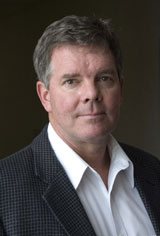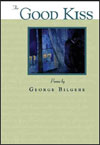Welcome to The Writer's Almanac Bookshelf, where you'll find highlighted interviews of poets heard on the show.
George Bilgere

What do you tell your students on the first day of class? Do you wonder if any of them are like you were, on a diversion from their planned path?
In my early days as an undergraduate I thought it would be nice to go into the sciences. First it was going to be biology — I was very interested in studying birds, for some reason — and then I toyed with the idea of being pre-med. It took just one, terrifying experience with Chemistry 101 to cure me of that delusion. And I realized I'd rather write about the world than dissect it. But in many ways the things I learned about in biology and zoology courses proved just as valuable to me as a writer as anything I learned in a writing workshop. For instance, the first poem I wrote as an undergrad — my first poem, period — was about Morris, the school cadaver. He'd been a janitor at the school for 30 years, and decided he wanted to stay on, even in death. I never would have met Morris if I'd started life as an English major. What is that joke? If you want to make God laugh, make a plan? I tell my students that life pretty much is a diversion, and the unexpected detours are what make it interesting. So, I want them to be open to the possibility of diversion, of the unexpected journey.
With the book of poems you published after your divorce, The Good Kiss (2002), you've said your work changed dramatically in regards to humor. Would you explain how this change occurred?
Anyone who's been through a serious break-up knows that you spend about six months or so talking about nothing but how miserable you are, how unfairly your ex treated you, and so forth. You end up driving all your friends away with your incessant self-pitying stories. That's exactly what I was doing after my divorce, and one day I realized that the only way I was going to get through this was by refusing to take it so seriously. So I began working on a book that would address not only the misery of divorce, but also the comical, rather pathetic predicament it puts you in. At the same time, I was becoming aware of other poets whose work managed the difficult trick of being both serious and funny at the same time — Billy Collins, Tony Hoagland, Denise Duhamel, Tim Seibles, Ron Koertge —and I realized that something was in the air, there was a new kind of ease and humor and frankness in poetry.
Writing that book, opening myself up to the possibilities of humor, felt like I'd pulled back the shades and opened the windows of the rather gloomy house of my own poetry. My sense was that the grimness of the post-confessional era — all that angst and Prozac — needed to lighten up a little, and I think we see that happening now. At the beginning of the 19th century you had the Romantic poets writing very earnestly about things like mountains and crags and sublimity. At the start of the 20th century Eliot and Yeats and Pound were writing these frighteningly austere poems about modernism, and now you have Tony Hoagland writing about dropping acid at a Hendrix concert and forgetting where he parked his car. What would Eliot think? Hard to picture Eliot at a Hendrix concert. Hmmm. Might be a poem there...
You have a poetry-themed radio show. What do you think radio adds to the experience of imbibing a good poem?
Some years back, Dana Gioia published that famous essay, "Can Poetry Matter?" At the end of the piece he suggested using radio to bring poetry to a larger audience. And he's right, of course. Radio is absolutely ideal. Hearing a poem while you're cruising along in your fancy car through your high-tech city reminds you that poetry started out as an oral, aural art. Perhaps the very simplest and most modest of the arts. Just a voice and a handful of words. I love that direct and immediate intimacy between reader and listener. So I developed this program in Cleveland called Wordplay. I read poems, local poets read their work, and nationally known people passing through our school, John Carroll University, read their stuff on the show as well. It's on at 12:30 in the afternoon, drive time, and I like to think about all these people in Cleveland driving to lunch while listening to poems by Emily Dickinson and Robert Pinsky and maybe a poem by a local auto mechanic who also happens to be a poet.
As a poet who has published a few books, done a lot of traveling, and has a comfortable job at a university, are there any unrequited dreams you plan to pursue in the near future?
Yes. Italy. Somehow, I've never been there, which is ridiculous. So, I'm on leave this year, and I plan to spend a few months living in a little town near Florence, or perhaps in Tuscany. This will be an experience I hope will involve a certain amount of wandering through old towns and museums, a certain amount of writing, and quite a lot of wine.
George Bilgere lives and writes in Cleveland, Ohio, where he is the director of the creative writing program at John Carroll University. His most recent book of poems, Haywire, won the May Swenson Poetry Award in 2006. A previous collection, The Good Kiss, won the University of Akron Poetry Contest in 2001. He is the host of Wordplay, a weekly radio poetry program airing Wednesdays at 12:30 p.m. on www.wjcu.org in Cleveland, Ohio.
